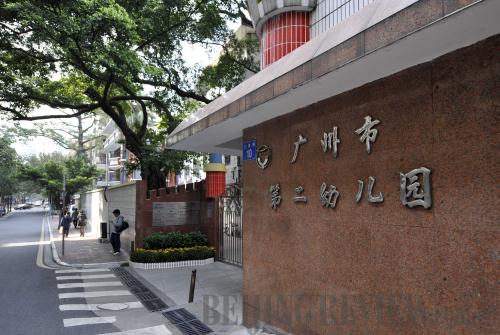|
 |
|
STAR FACILITY: A prestigious public kindergarten in Guangzhou, south China's Guangdong Province (CHEN YEHUA) |
According to a survey conducted by the China Democratic League, the number of kindergartens in Beijing fell from 3,056 in 1990 to 1,266 in 2009, down 58.57 percent.
Only 40 percent of Beijing's kindergartens are directly funded by the government, around 30 percent are classified by the Beijing Municipal Education Commission as first-rate public kindergartens and only 70 kindergartens are city-level model kindergartens.
Liu Yan, a professor of early childhood education at Beijing Normal University, told China Education News in March that the government has long directed limited resources for preschool education only toward public kindergartens, a practice that has caused enormous complaints from the public. According to him, without radical change to their allocation approaches, more and more children would be deprived of the opportunity to benefit from public resources.
In Guangzhou, there are a total of 1,548 kindergartens, of which only 396 are public ones. Qu Shaobing, director of the city's education bureau, told the China National Radio in May that the city plans to draw lots to allocate slots in public kindergartens to ensure fair access to public education resources.
In April 2011, Nanjing, capital of east China's Jiangsu Province, started to distribute education vouchers of 2,000 yuan ($314) per year to every kindergarten-age child living in that city for three years and families can use the vouchers to pay fees at childcare facilities, whether they are private or public. Kindergartens will be offered government subsidies according to the number of vouchers they receive.
"I hope that the Beijing Municipal Government will adopt a similar policy, which would be fairer to taxpayers," Wang Qinghong, Principal of the Beijing New Century Kindergarten.
Zhu Yongxin, a member of the Standing Committee of the National People's Congress, China's top legislature, said that the preschool education system should gradually become government-dominated to ensure fairness and quality and make sure that all children can have the opportunity to attend a public facility.
Zhu suggested that besides opening more public kindergartens, the government should also give tax breaks to enterprises running kindergartens for their employees, provide venues for kindergartens operated by charitable organizations free of charge and purchase services from private kindergartens.
Zhu said that there should not be major differences in facilities, teaching levels and budgets between different public kindergartens and people with professional training in preschool education should be encouraged to provide day care at their private residences.
In May 2011, the Beijing Municipal Government released a policy encouraging the opening of small-scale kindergartens with 40 to 100 students. Individuals who are interested in opening one are required to have a household registration record in Beijing and provide registered capital of 500,000 yuan ($78,589).
"I don't understand where such a registered capital requirement comes from," Zhang Yan, a professor of early childhood education at Beijing Normal University, told China Times. Zhang said that even some unlicensed kindergartens with poor conditions are meeting demands of migrant worker families in Beijing. "The government should give these facilities more attention rather than exclude them from support."

Email us at: lili@bjreview.com | 